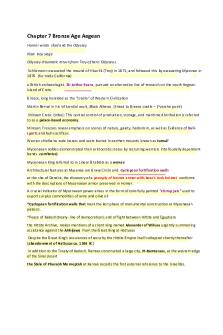PHI Midterm 1 notes PDF

| Title | PHI Midterm 1 notes |
|---|---|
| Course | Philosophical Issues in Health Care |
| Institution | University of Ottawa |
| Pages | 2 |
| File Size | 52.9 KB |
| File Type | |
| Total Downloads | 111 |
| Total Views | 159 |
Summary
notes and practice questions from lectures 1-4...
Description
Short answer topic responses: ●
What is meant by a moral theory? A moral theory tries to give a complete answer
to what is it that determines if an act is right or wrong?. By answering this question, it can help anyone determine whether an act is right or wrong, and also attempts to explain why some are wrong or right. A plausible moral theory needs to be considered with our moral sense, with our careful considered moral judgement in different situations, and helpful in figuring out which acts are right. There are 2 types of moral theory: Consequentialism and non consequentialism. Consequentialism is the rightness or wrongness of an act which depends only on its consequences, an example of this is lying. Depending on the type of and the consequences of your words. Non consequentialism is that consequences are not the only thing that affects the morality of an act. A good moral theory should be consistent with our moral sense, consistent with or carefully considered moral judgements in different situations and helpful in figuring out which acts are right. ● The principle of utility and how utilitarians would justify it? Utilitarianism is the most prominent form of consequentialism. Meaning only that the consequences of act should be considered. It is a theory that is accepted by many philosophers today. The main principle is that to determine what makes an act right, is that it must promote the most happiness. This includes how it makes us feel but also how it makes others feel. Utilitarians claim that only one thing is intrinsically good and that is happiness. They say that each person's happiness is of equal value. In summary, they believe that we should only do acts that will produce the most overall happiness. ● Why is utilitarianism regarded by its proponents as a progressive doctrine? it would justify, or require: Abolition of slavery and discrimination, The abolition of child labour, Equality for women, Animal welfare, Programs for public health and safety, Helping the poor, Prison reform.
● Three major objections against act untiliarisnms - explain them carefully? The three major objections against act utilitarians are: 1. The theory is too impractical. Happiness is a very subjective emotion. Because of this, it makes it hard to anticipate how much happiness the act will produce. It is also hard to predict the indirect future of making the decision unclear.
2. This theory might sometimes lead to unfairness. Utilitarianism does not ask why it is fair, it is not something that gets considered. They only consider the amount of happiness this act will create. 3. Lastly, it gives weight to pleasures that are bad/immoral. Pleasure to them is always a good thing even though for us we might consider things not pleasurable (HUnting animals) in other words, some pleasures are morally bad or following this theory can cause harm. 5. The distinction between act and rule utilitarianism? a. Act utilitarianism applies to specific acts. It applies the principle that you should always try to do those acts that will produce as much happiness as possible. b. Rule utilitarianism applies to rules that everyone should follow without exception. The principle is that you must first determine what rules would maximize happiness in society, and then follow those rules. Rule utilitarians don't claim to know what those rules are....
Similar Free PDFs

PHI Midterm 1 notes
- 2 Pages

PHI Notes 8
- 3 Pages

Midterm 1 notes
- 20 Pages

Midterm 1 Notes
- 4 Pages

Notes for midterm 1
- 5 Pages

Notes for Midterm 1
- 33 Pages

Midterm 1 Lecture Notes
- 174 Pages

Nutrition 120 midterm 1 notes
- 19 Pages

IPH Notes Through Midterm #1
- 94 Pages

RPH Midterm - Lecture notes 1
- 14 Pages

HE 211 Midterm 1 Notes
- 3 Pages

Psyc 360 Midterm 1 Notes
- 12 Pages
Popular Institutions
- Tinajero National High School - Annex
- Politeknik Caltex Riau
- Yokohama City University
- SGT University
- University of Al-Qadisiyah
- Divine Word College of Vigan
- Techniek College Rotterdam
- Universidade de Santiago
- Universiti Teknologi MARA Cawangan Johor Kampus Pasir Gudang
- Poltekkes Kemenkes Yogyakarta
- Baguio City National High School
- Colegio san marcos
- preparatoria uno
- Centro de Bachillerato Tecnológico Industrial y de Servicios No. 107
- Dalian Maritime University
- Quang Trung Secondary School
- Colegio Tecnológico en Informática
- Corporación Regional de Educación Superior
- Grupo CEDVA
- Dar Al Uloom University
- Centro de Estudios Preuniversitarios de la Universidad Nacional de Ingeniería
- 上智大学
- Aakash International School, Nuna Majara
- San Felipe Neri Catholic School
- Kang Chiao International School - New Taipei City
- Misamis Occidental National High School
- Institución Educativa Escuela Normal Juan Ladrilleros
- Kolehiyo ng Pantukan
- Batanes State College
- Instituto Continental
- Sekolah Menengah Kejuruan Kesehatan Kaltara (Tarakan)
- Colegio de La Inmaculada Concepcion - Cebu



